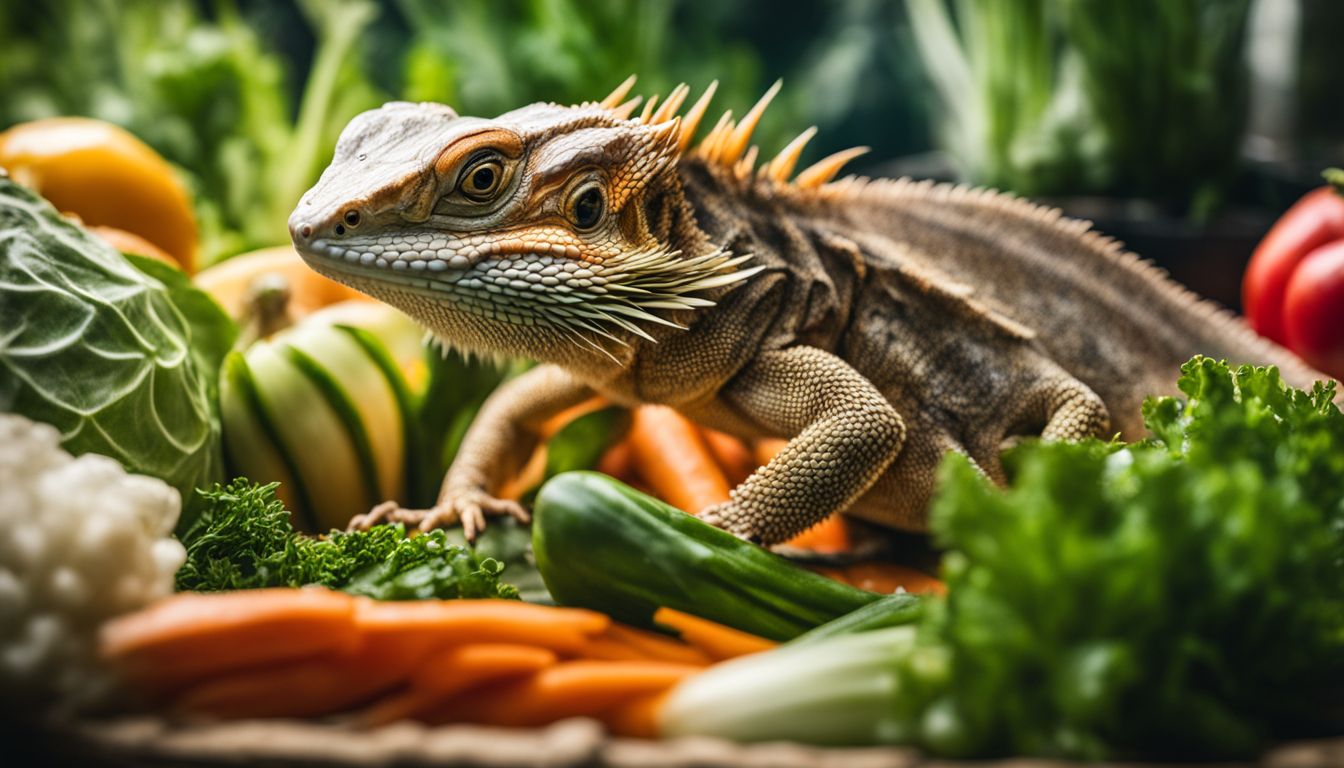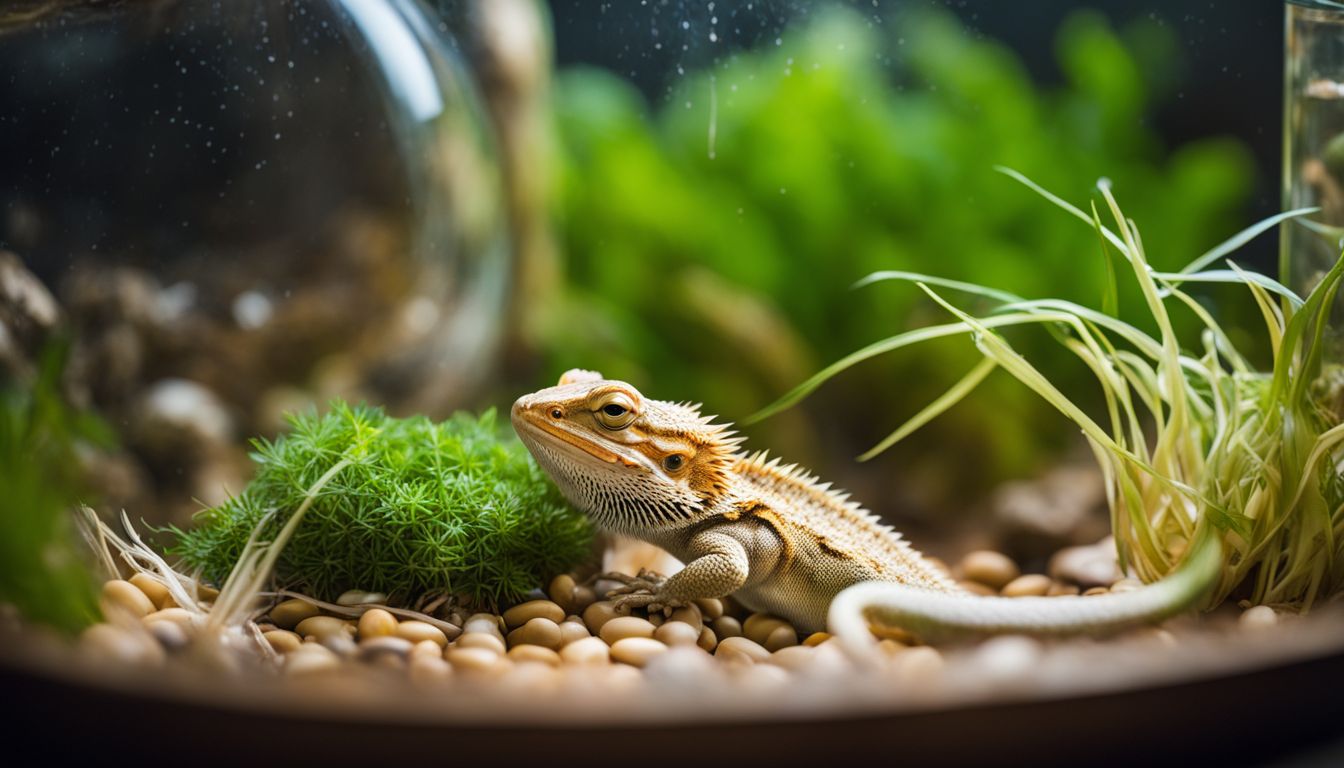Deciding what to feed your bearded dragon can often lead to confusion. Did you know that bearded dragons can enjoy bean sprouts safely? This article will guide you through the ins and outs of incorporating bean sprouts into their diet.
Stay tuned for some eye-opening facts!
Understanding Bean Sprouts: Nutritional Composition and Benefits for Bearded Dragons

Moving from the basics, let’s dive deeper into what makes bean sprouts a noteworthy option for your bearded dragon’s diet. These sprouts pack a nutritional punch with their high vitamin C and iron content—both crucial for maintaining a healthy reptile.
Vitamin C bolsters immune function, while iron supports blood health, making these nutrients vital components of your pet’s overall well-being.
However, it’s not all straightforward; bean sprouts come with their share of considerations. They are harder to digest and contain phytates that can hinder nutrient absorption. Despite this, bean sprouts offer benefits when included occasionally in moderation.
Their protein content is welcome but remember—their calcium: phosphorus ratio isn’t ideal. This means they’re best served as part of a varied diet that meets all the nutritional needs of bearded dragons without overreliance on any single food item.
Can Bearded Dragons Eat Bean Sprouts: Facts and Misconceptions

Bearded dragons can indeed enjoy bean sprouts in their diet, tackling one of the major misconceptions head-on. Many people think these veggies are off-limits for their scaly friends due to nutritional misgivings.
However, the truth is that while bean sprouts—mung bean sprouts included—are not toxic to bearded dragons, they should be served in moderation due to their calcium: phosphorus ratio, which isn’t ideal for these reptiles.
This balance is crucial because it affects how well a dragon can metabolize and use calcium, essential for bone health and overall vitality.
The idea that bean sprouts hold no value for a bearded dragon’s diet couldn’t be further from reality; they are actually packed with dietary fiber but low in nutritional value compared to more beneficial vegetables.
Given this, it’s clear why feeding them sparingly is advised. The presence of dietary fiber is commendable but doesn’t overshadow the need for a varied diet rich in nutritious vegetables that support optimal health and well-being among beardies.
Despite some lingering doubts within the community, introducing bean sprouts into your pet’s meal rotation — mindfully and occasionally — could add some welcome variety without causing harm.
Exploring Other Safe Vegetables for Bearded Dragons
Moving beyond bean sprouts, let’s dive into a variety of vegetables that are great for your reptile friend. Our goal is to ensure your bearded dragon enjoys a balanced diet rich in nutrients. Here’s a list of safe veggies to add to their menu:
- Kale: Packed with vitamins A, K, and C, kale supports eye health and immune function. However, it’s best served in moderation due to its high calcium-binding properties.
- Squash: Both summer and winter varieties are excellent for bearded dragons. Squash provides beta-carotene, which converts to vitamin A in the body, supporting skin and vision health.
- Bell Peppers: A fantastic source of vitamins C and A, bell peppers can brighten up your dragon’s diet with their crunch and color. Always serve them raw and finely chopped.
- Carrots: Given occasionally, carrots offer beta-carotene and vitamins that promote good vision and immune system health. Remember to grate them to prevent choking hazards.
- Collard Greens: These leafy greens are known for their high calcium content, which is crucial for bone health. Chop them into bite-sized pieces for an easy-to-eat snack.
- Dandelion Greens: Far from a weed in the bearded dragon world—dandelion greens are rich in calcium and vitamins K, A, and C. Ensure they’re pesticide-free before serving.
Potential Risks and Precautions When Feeding Bean Sprouts to Bearded Dragons
Feeding bean sprouts to bearded dragons occasionally is okay but should not become a regular part of their diet due to the imbalanced calcium: phosphorus ratio. Bean sprouts have high fiber and low nutritional value, so they are not ideal for consistent feeding.
To maintain reptile health, it’s important to offer a variety of safe vegetables and occasional treats while keeping an eye on the nutritional balance. Additionally, consider consulting with a reptile veterinarian for tailored nutritional supplements and feeding precautions based on your bearded dragon’s specific needs.
Remember – balanced nutrition is key; consult experts for personalized advice on your pet’s dietary needs.
Conclusion
In conclusion, bean sprouts can be a safe and occasional addition to a bearded dragon’s diet. While they offer some nutritional benefits like dietary fiber and essential vitamins, they should not be the primary source of nutrition for these reptiles.
When feeding your bearded dragon bean sprouts, ensure you provide a diverse and balanced diet to support their overall health and well-being. Remember that while bean sprouts are vet-approved for consumption, moderation and variety are key in maintaining your pet’s optimal nutrition.
FAQs
1. Can bearded dragons eat bean sprouts?
Yes, bearded dragons can eat bean sprouts as an occasional treat, but they should not be a staple in their diet.
2. Are bean sprouts nutritious for bearded dragons?
Bean sprouts are high in water content and may not provide significant nutritional value for bearded dragons.
3. How should I feed bean sprouts to my bearded dragon?
When feeding bean sprouts to your bearded dragon, ensure they are thoroughly washed and offer them in small amounts as part of a varied diet.
4. Can too many bean sprouts harm my bearded dragon?
Feeding excessive amounts of bean sprouts to your bearded dragon can lead to digestive issues, so moderation is key.
5. What other foods are better suited for a bearded dragon’s diet than bean sprouts?
Beet greens, collard greens, dandelion greens, and mustard greens are more suitable options for the regular diet of a healthy adult bearded dragon.




